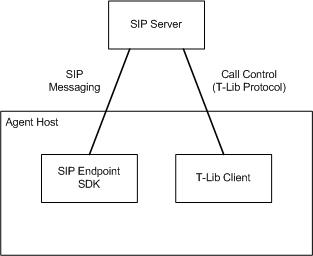Welcome
The SIP Endpoint SDK enables you to build a SIP endpoint that can seamlessly connect agent desktop applications with the Genesys SIP Server in order to handle audio and video calls. This overview will help you understand its design goals and its architecture, which are now supported on both .NET and Apple's OS X Lion.
Design Goals
Many SIP softphones that are currently available require an agent to interact with their own separate user interface in addition to that of the agent desktop application. For instance, the agent might have to use the SIP phone interface to answer a call, while other actions — such as holding or releasing the call — would have to be done via agent desktop interface.
In contrast to that, the SIP Endpoint SDK is designed to be integrated into an agent desktop so the agent can use a single user interface to control calls. Genesys recommends that this be done in a way that leaves actual control in the hands of a T-Lib–based agent desktop application, which has a fuller feature set and is also fully supported by Genesys.
The SIP Endpoint SDK is also designed to integrate with the Genesys SIP Server. It supports the SIP, SDP, and RTP/RTCP protocols.
In addition to these principal design goals, the SIP Endpoint SDK supports the following features:
- Traditional call control functionality such as:
- Establishing inbound and outbound calls
- Hold and retrieve
- Transfers and conference calls (Note that SIP Endpoint SDK does not handle transfers and conference calls directly. You must use third-party call control in order to enable these features.)
- Multi-line call handling
![]() Note: Multi-line call handling is available up to the limitations on the number of simultaneous connections supported by the licensing available to Genesys at this time.
Note: Multi-line call handling is available up to the limitations on the number of simultaneous connections supported by the licensing available to Genesys at this time.
Architecture
The SIP Endpoint SDK is a software component that resides on the agent's computer. It uses the SIP protocol to communicate with the Genesys SIP Server and supports both thin (or 3-tier) and thick (or rich) T-Lib clients.
In SIP messaging terms, the SIP Endpoint is a user agent. The contact center agent's computer should also host a Genesys T-Lib client that works with SIP Server and provides Genesys agent-related functionality, as shown below.
As you can see, the SIP Endpoint SDK handles the SIP messaging, and the T-Lib Client uses the T-Lib protocol to handle call control.
SDK Components
The components of the SIP Endpoint SDK are described on the following pages:
Supported Codecs
SIP Endpoint SDK 8.1.2 supports the following codecs:
- PCMU/8000 (G.711/mu-law)
- PCMA/8000 (G.711/A-law)
- G722/16000 (G.722)
- ISAC/16000 (iSAC/16kHz — internet Speech Audio Codec)
- ISAC/32000 (iSAC/32kHz)
- ILBC/8000 (iLBC — internet Low Bitrate Codec)
- VP8 video
Working with the SIP Endpoint SDK for .NET
The SIP Endpoint SDK for .NET distribution includes the following files, which you can use "as is" in your custom applications:
- Genesyslab.Sip.Endpoint.dll
- Genesyslab.Sip.Endpoint.Provider.Genesys.dll
These files are located in the \QuickStart\Bin directory at the root level of the SIP Endpoint SDK directory.
The SIP Endpoint SDK also depends on the following Genesys and third-party libraries, which should be present in the working directory:
- intl.dll
- libgio-2.0-0.dll
- libglib-2.0-0.dll
- libgmodule-2.0-0.dll
- libgobject-2.0-0.dll
- libgthread-2.0-0.dll
- libnice.dll
- zlib1.dll
- Genesyslab.Core.dll
- Genesyslab.Platform.Commons.Collections.dll
- Genesyslab.Platform.Commons.Connection.dll
- Genesyslab.Platform.Commons.dll
- Genesyslab.Platform.Commons.Protocols.dll
- Genesyslab.Platform.Logging.dll
- Genesyslab.Platform.Management.Protocols.dll
- Genesyslab.Sip.Endpoint.dll
- Genesyslab.Sip.Endpoint.Provider.Genesys.dll
Learning More
To continue learning about the SIP Endpoint SDK, we recommend you read the pages describing SIP-Based Third-Party Call Control to understand messaging patterns. After that, you should be ready to use the Deployment Guide to install the SDK on your system.
Once you have installed the SDK, you may want to check the following pages from the Developer's Guide:
- SIP Endpoint SDK Configuration for .NET and for Apple OS
- SIP Endpoint SDK Disaster Recovery and Geo-Redundancy for .NET

